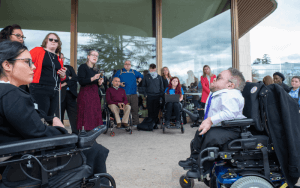Disabled people in Wales have been “systematically” let down by the UK and Welsh governments during the “devastating” cost-of-living crisis, a new report has found.
The Barely Surviving report, launched this week by Disability Wales, says many disabled people in Wales have been caused “significant harm” by the cost-of-living crisis, with “insufficient” measures taken by government.
The report warns of evidence suggesting that disabled people were “slipping through the cracks and struggling on their own” because of a lack of “joined up support” between the NHS, local authorities and the Welsh government.
It says this must become a “national priority” for the Welsh Senedd.
Disability Wales said the UK and Welsh governments “must act urgently and meaningfully” in response to the “harrowing lived experiences of disabled people” exposed by the research.
The report warns of an “ongoing crisis” in disabled people’s mental health, which is not being addressed.
Multiple respondents to a survey for the report said they had experienced suicidal ideation, with one reporting that a disabled friend had taken their own life “after feeling like a financial burden on their family”.
One respondent reported worsening asthma and anxiety attacks because they were not able to keep their home heated.
Of the 74 survey respondents, 52 said their physical health had been impacted by the cost-of-living crisis, while 58 respondents said their mental health had been affected.
The report says many disabled people are unable to afford three meals a day or pay for the impairment-related diets they need.
Others are experiencing increasing levels of social isolation because of the lack of access to transport.
About 100 disabled people, as well as disabled people’s organisations, contributed to the research by Disability Wales.
One disabled person who took part in the research said: “What’s worse is not knowing what to expect next, how much more costs will increase.”
Some respondents reported having to sell possessions to pay their bills.
Of those who took part in the survey, 53 of 74 respondents said they had had to cut back on their spending on transport, which left many “increasingly isolated”.
A similar number said they had cut back on their spending on food, with even more having to cut back on clothing and leisure.
Among the report’s recommendations is a call for personal independence payment to be devolved to the Welsh government – as it has been in Scotland, which has designed its own replacement benefit – which would allow a “coproduced approach to the design and assessment process in line with the social model of disability”.
It also calls for regulators such as Ofgem and Ofcom to “make sure that disabled people don’t overpay for everyday essential services”, and for an urgent review of the Welsh government’s policy on social care charges.
And it calls for resources and capacity-building measures to ensure the creation and sustainability of at least one disabled people’s organisation in every local authority area in Wales.
Rhian Davies, chief executive of Disability Wales, told an online event held to launch the report: “Although there has been a lot of universal support with payments for energy bills and that sort of thing, there’s been very little targeted at disabled people, despite the fact that disabled people face higher costs in terms of… disability-related expenditure.
“Also, disabled people are more likely to live in poverty. That combination of factors we feel is being completely overlooked by the UK and… Welsh governments.
“The report is an important way for us to highlight that and use as a springboard to work with governments and other stakeholders to get these issues addressed.”
She said the Welsh government must use its Disability Rights Taskforce* and Disability Rights Action Plan – due for publication next year – to “make a radical change”.
She said: “I think we are all a bit tired of having promises made and then things not following through.”
*The taskforce was set up to address the inequalities exposed by the Locked Out report into the impact of the pandemic on disabled people in Wales
A note from the editor:
Please consider making a voluntary financial contribution to support the work of DNS and allow it to continue producing independent, carefully-researched news stories that focus on the lives and rights of disabled people and their user-led organisations.
Please do not contribute if you cannot afford to do so, and please note that DNS is not a charity. It is run and owned by disabled journalist John Pring and has been from its launch in April 2009.
Thank you for anything you can do to support the work of DNS…

 UN’s ‘damning verdict’ is ‘vindication’ of fightback against government’s rights violations
UN’s ‘damning verdict’ is ‘vindication’ of fightback against government’s rights violations Sunak’s ‘chilling, threatening’ speech on benefits ‘demonised disabled people’
Sunak’s ‘chilling, threatening’ speech on benefits ‘demonised disabled people’ It was emergency planning that was vulnerable during Covid, not disabled people, inquiry is told
It was emergency planning that was vulnerable during Covid, not disabled people, inquiry is told